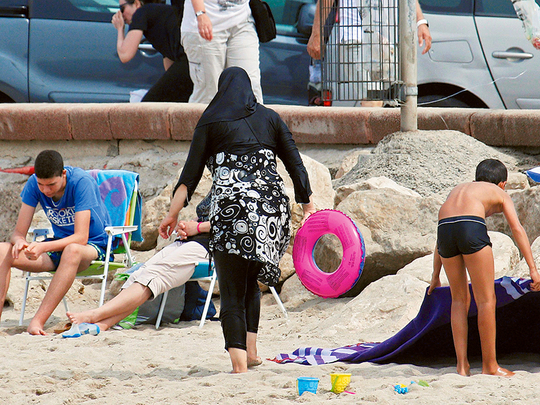
Paris: France’s highest administrative court on Thursday was set to examine a request to scrap a ban on the burkini swimsuit which has sparked a furore in the country.
The Human Rights League (LDH) is appealing a decision by a lower court in the Riviera city of Nice which upheld a ban on the outfit by the town of Villeneuve-Loubet.
Villeneuve-Loubet, just west of Nice, was among the first of some 30 French towns to ban the burkini, triggering a fierce debate in France and elsewhere about the wearing of the full-body swimsuit, women’s rights and secularism.
The Nice tribunal ruled on Monday that the ban in Villeneuve-Loubet was “necessary, appropriate and proportionate” to prevent public disorder after a succession of militant attacks in France, including one in Nice on July 14.
The burkini was “liable to offend the religious convictions or (religious) non-convictions of other users of the beach,” and “be felt as a defiance or a provocation exacerbating tensions felt by” the community, it added.
The ruling by the State Council, France’s highest administrative court, will provide a legal precedent for towns to follow around the country.
The vague wording of the prohibitions has left beachgoers puzzling over whether it refers solely to the burkini — an Islamic swimsuit that originated in Australia — or to being fully clothed and having one’s head covered on the seashore.
A mother of two told AFP on Tuesday she had been fined on the beach in the resort of Cannes wearing leggings, a tunic and a headscarf.
“I was sitting on a beach with my family. I was wearing a classic headscarf. I had no intention of swimming,” said the 34-year-old who gave only her first name, Siam.
Anouar Kbibech, the head of the French Council of the Muslim Faith (CFCM), on Wednesday called an urgent meeting with Interior Minister Bernard Cazeneuve, saying he was “concerned over the direction the public debate is taking.”
Some fear that burkini bans in several French towns are worsening religious tensions. The bans, based on a strict application of secularism policies, have exposed division within the government.
Prime Minister Manuel Valls told BFM television Thursday that burkinis represent “the enslavement of women” and reiterated his support for mayors who have banned them.
But Education Minister Najat Vallaud-Belkacem, a feminist with North African roots, said that while she doesn’t like the burkini swimsuit, bans of the garment are politically driven and unleashing racist sentiment.
“My dream of society is a society where women are free and proud of their bodies,” she said on Europe-1 radio. But with tensions in France high after a series of deadly Islamic extremist attacks, she said, “We shouldn’t add oil to the fire” by banning burkinis.
The prime minister, while stressing his opposition to the burkini, urged police to implement the bans fairly and respectfully.
Two human rights groups, arguing the bans are discriminatory, have appealed to the Council of State to overturn the measures.
The council is holding a hearing in the case Thursday and is expected to rule within 48 hours. The ruling specifically concerns a ban in the Riviera town of Villeneuve-Loubet, but the decision will be binding and set legal precedent on the increasingly heated question of whether cities can tell Muslim women what to wear to the beach.
The Human Rights League and the Collective Against Islamophobia in France say the mayor’s decree violates basic freedoms of dress, religious expression and movement.
The Villeneuve-Loubet order bars from local beaches any people whose garments don’t respect the principles of secularism, health and safety rules and good moral standards. Like other local decrees, the Villeneuve-Loubet ban doesn’t explicitly mention the word “burkini.”
Religious clothing is particularly sensitive in France, where an unusually large part of the population has no religious affiliation, and where the first provision in the constitution says France is a “secular Republic.”











